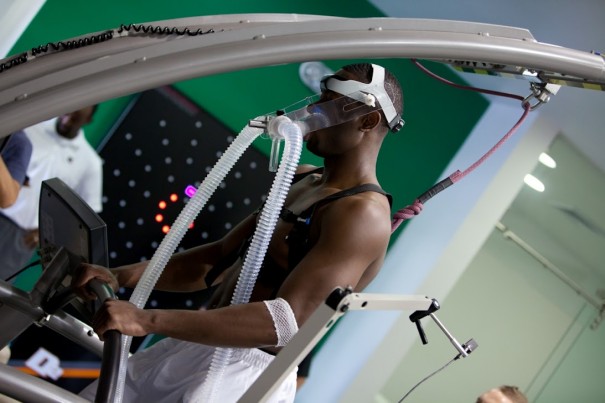
BRADENTON, Fla. — Dwyane Wade’s body is spent. He’s in absolute agony. He’s gritting his teeth and taking huge gasps of air as the clock is ticking down, all while people surround and implore him to keep going all the way to the finish.
This isn’t a 48-minute NBA game watched by thousands of fans.
It’s a 30-second stationary bike ride watched by a few scientists.
“If there’s an edge that we can find,” Wade said afterward, “I want to find it.”
So he went looking for it at the Gatorade Sports Science Institute, becoming the first athlete tested at the company’s new lab on the campus of IMG Academies in southwest Florida.
For the better part of a day, Wade went through a battery of tests. Some were typical, such as blood work. Some were not particularly taxing, such as when he simply lay still for a few minutes while a machine scanned his body to determine its composition. Some were arduous, as with the treadmill that could show how quickly he burns through carbohydrates while exercising, and that diabolical, high-resistance exercise bike.
“Just trying to get myself that edge, so I don’t have to deal with that as much. Hydration is so important, so huge, especially with me. I lose five pounds after each game.” – Dwyane Wade
Take the data, add it up, and an already elite player for the Miami Heat might be able to get a little bit better.
“It’s kind of exciting,” said Dr. JohnEric Smith, the associate principal scientist at the lab who monitored Wade’s tests. “My research focus has always kind of been on wanting to know what are the limits of human performance. And having access to athletes like a Dwyane Wade, who’s already on top of his sport. and try to identify ways to make him a little better, that’s exciting to me.”
In basic terms, the institute takes its studies on the effects of exercise and nutrition and tries to turn those findings into better products. More labs are planned to open internationally in the coming months.
For everyday people, subtle changes to a sports-drink formula may not necessarily have much of an effect.
But for Wade and athletes of his ilk, that’s not the case.
One of the tests — Wade running on a treadmill, breathing through high-tech headgear — showed he burns through carbohydrates faster than most athletes. By adjusting what he eats and drinks a bit on game day, just based on that one finding, Wade very easily could find himself able to be more effective in the closing minutes of games.
“If it makes me 1 percent better, it makes me a better player,” Wade said.
One thing scientists came away from Wade’s testing particularly pleased with was that he was willing to do whatever they suggested.
And some of it, well, made Wade look just a little silly.
Here’s the scene: He’s facing the wall, palms out, looking at what’s called a DynaVision Training Device. He had to keep his eyes fixed on the center of the device, which was about 3 feet wide and 3 feet high. A small screen would generate a four-digit number every few seconds, and Wade would have to call it out at the same time he tapped whichever of dozens of lights that would randomly turn red.
The first time, Wade didn’t do as well as he liked.
The second time, he saw his score and raised his arms in celebration.
“It’s come a long way,” said Dr. Asker Jeukendrup, the global senior director of Illinois-based GSSI, when asked how research into athletic performance is evolving. “Where the big advances will be is in how we actually educate the athletes. Products will develop, but what really needs to happen is the education.”
Wade went to the testing with specific requests.
Like any athlete, he’s always looking for more endurance. But he’s also been prone to cramping, no matter how much he drinks on game days or replenishes during workouts or games. He hopes his trip to the lab, where sports nutrition, as well as hydration, is studied, leads to better answers.
“Just trying to get myself that edge, so I don’t have to deal with that as much,” Wade said. “Hydration is so important, so huge, especially with me. I lose five pounds after each game. Just trying to get that competitive edge that I need, especially as I get older, you can’t rely on your youth as much, so you keep trying to find that something.”
He came away from the five hours or so of work convinced that the testing was worthwhile. Wade has tried to stay as close to game shape as he can during the NBA lockout, simply because no one knows when the call will come to announce that it’s time to head to training camp with a new labor deal.
On this particular day, Glen Davis of the Boston Celtics also was training at IMG, albeit in a different area than the GSSI lab. Davis popped into the testing briefly and chatted with Wade for a bit, but collected no secrets about what the 2006 NBA Finals MVP was trying to learn about himself.
For that matter, no one else will get those secrets, either. Wade said it was humbling to be the first athlete to go through the new lab, and can’t wait to put the newfound knowledge to use.
“At first, you don’t want it out. At first, if you do find something that can help you and give you an edge, you want to keep that edge,” Wade said. “And then eventually, you pass it on. It might get passed on to a close friend, a teammate. And then if it’s something that’s game-changing, then you pass it on to everyone else. But before I say anything, I want to make sure it works for me.”
No comments:
Post a Comment